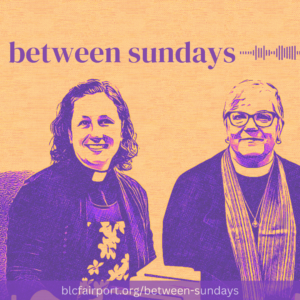Between Sundays for Week of March 10, 2025
We’ve begun our Lenten series, “Jesus: A way in the wilderness,” we look to Jesus to find our way through the wilderness of our lives. As Pastor Amy described on Ash Wednesday, the wilderness is “the place where we don’t know which way to go, where we don’t know what comes next, where the usual supports have disappeared. Wilderness is a place where we may feel unmoored, directionless, lost, uncertain, where hard work and traps – in the words of [the hymn] toil and snares – seem to appear around each new corner” (listen to Pastor Amy’s full Ash Wednesday sermon here, starting around 9:50).
On the first Sunday of Lent, Jesus finds himself in the wilderness. Immediately after he is baptized by John in the river Jordan, Jesus spends 40 days and 40 nights in the wilderness being tempted and tested by the devil.
The first lesson we glean from Jesus’ time in the wilderness is that God’s Spirit was with him every step of the way. The Spirit accompanied Jesus for every second of his 40 days, and we can be assured that same Spirit is with us every step of our way in the wilderness, too.
Second, we learn that nothing can change who Jesus is. Jesus is God’s beloved Son. The devil tries to turn this absolute truth of Jesus’ identity into a conditional statement. If you are God’s Son, prove it. Command these stones to become loaves of bread. Throw yourself down from the pinnacle of the temple and trust God to save you. And when that doesn’t work, he resorts to accepting who Jesus is but trying to convince him to abandon himself: Deny who you are. Renounce God and worship me instead.
When we feel desperate to escape the wilderness, it can be tempting to believe the devil’s lies – that all the power and glory can be ours. It can be tempting to believe that we can in fact save ourselves – if we just follow the right diet or adopt a more positive mindset or stayed on top of our to-do list more efficiently. It can be tempting to believe that our goal ought to be getting out of the wilderness in the first place.
Yet God sent Jesus into the wildernesses of the world – to all the places where life isn’t as God intended, to all the places where evil reigns, where the devil tries to turn God’s absolute promises into conditional ones – not because God was the one testing and tempting Jesus, but because that’s where the people and places that need to know God’s love and grace and mercy are found. God’s Spirit accompanied Jesus, never abandoning him, and giving him all that he needed every step of the way.
God does the same for us.
In other words, the wilderness of the world never gives us more than our God can handle. May this truth and the power of the Spirit alongside us give us the strength, courage and will to find our way in the wilderness.
P.S. Watch Sunday’s service to hear Pastor Hoffman’s full sermon (starting at about 13:00)! View past services on the Share in Worship page of BLC’s website!
Faith Connection at Home
Here is a wonderful reflection about Lent that helps describe “fasting” in a way that may be easier for children and teens to understand. We used this reflection for discussion in our LYO class this Sunday.
Catalyst Question: Name three things that you’re able to do but should not do. Why don’t you do them?
Fasting for Others: Lent this year begins with Ash Wednesday on March 5th. If you’ve heard of Lent before, you might have encountered the practice of fasting. To fast is to temporarily stop doing something you’re normally allowed to do, like eating sweets or red meat. The purpose of fasting, according to the Rev. Dr. Anne Burghardt, is not just personal sacrifice but also to increase our understanding of others’ needs. Rev. Dr. Burghardt, the General Secretary of The Lutheran World Federation, reminded listeners in a recent sermon that the purpose of fasting is to turn us outward: toward God and toward others.
This Lent, consider adopting a fast that puts positive attention on other people. If you give up a food, consider how you can share food with others. If you give up a hobby, consider how you might spend intentional time with others. If you give up buying things, consider how you might give generously to others.
Ask Yourself: If I choose to fast, how will I focus that practice focuses on God and others, rather than myself alone?
Ask a Friend: What are the Lenten practices you’ve experienced that helped you better connect with God or others? If you’ve not practiced Lent before, what changes have you made in your life to create better relationships?
Patty Chaffee
Family Faith Formation Coordinator
Ponderings
The Psalms of Lament give voice to the wilderness experiences of our ancestors in faith and remind us that as long as God’s people have been expressing their faith, lament has been a faithful response.
The Psalms of Lament were originally written as poems, prayers, or songs. In that spirit, we’ve compiled a Lament playlist of songs to accompany our Lenten theme Jesus: A Way in the Wilderness. These songs stretch beyond traditional hymns to express lament through a variety of musical expression.




